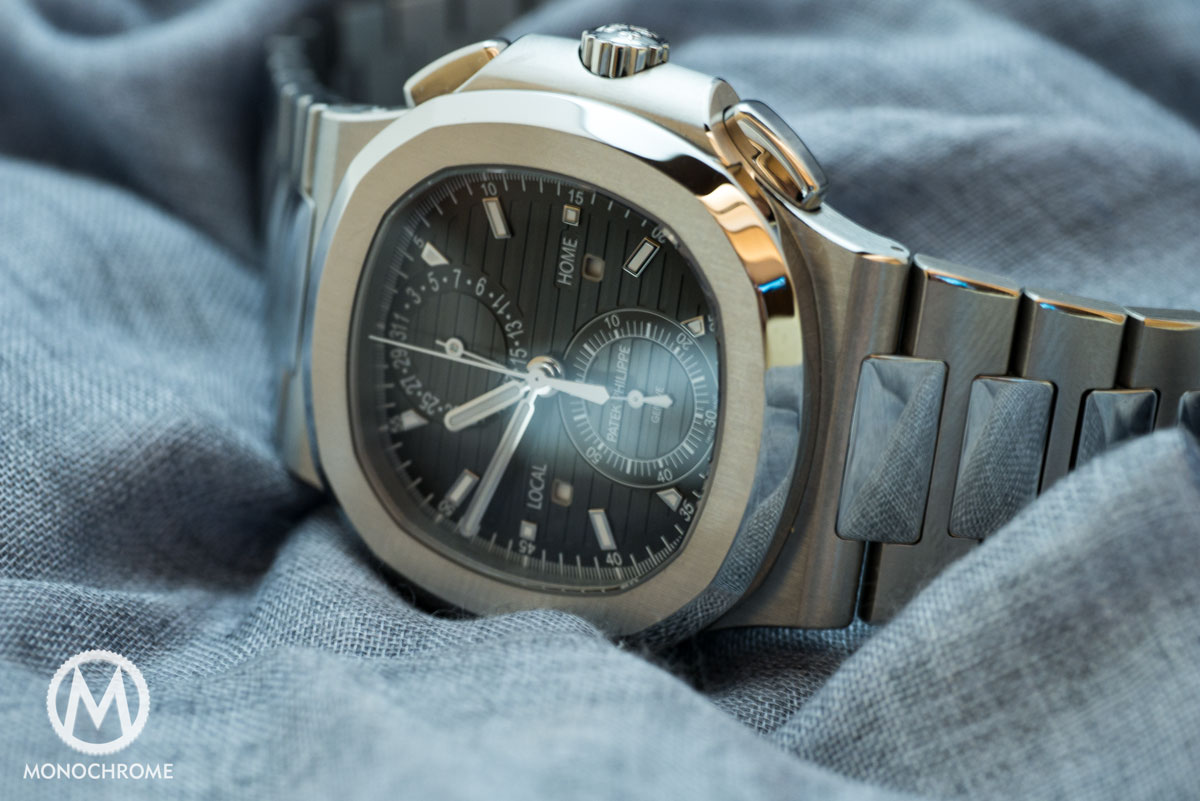Patek Philippe Nautilus Travel Time Chronograph ref. 5990/1A Replaces the Steel Nautilus Chronograph ref. 5980/1A

This is quite something. Just two years ago Patek Philippe introduced a new 5980/1A with white dial (for laymen: that’s the Nautilus Chronograph) and now, two years later, they discontinue the steel 5980/1A models and replace it with a steel Nautilus Chronograph with a second time zone, as we know it from the Aquanaut Travel Time ref. 5164.
That means that the 5980/1A-019 (the white dial Nautilus Chrono) has been in production for just two year. Since we’re talking about Patek, productions numbers are rather low, and this reference is now a very rare bird and we expect it to become very collectible. Although the other steel 5980/1A models are not as rare (but super rare compared to a Submariner for instance), we would not be surprised if the prices climb, now the demand cannot be fulfilled at the Patek boutique anymore and only on the second hand market. Now on to the newbie in the Nautilus family, which has an additional second time zone function, that looks and functions just as the Aquanaut Travel Time that Patek introduced in 2011 (see here).

On the dial we see the chronograph register at 6 o’clock, and, similar to the Aquanaut Travel Time, it features a pointer-date, now positioned on the upper part of the dial. The date indication is connected to the local time, which is your travel destination. When travelling, it can be adjusted both forward and backward, to follow the date of the time zone where you are. Left and right on the dial are two small apertures, which indicate day and night in both the local time zone and the home time zone.
The chronograph pushers – to start, stop and reset to zero – are located on the left-hand side of the case. Just like on the Nautilus Chronograph ref. 5980/1A. Where the old 5980/1A had a 60-minute and 12-hour register for measuring elapsed time, the new ref. 5990/1A has just one 60-minute counter. While you’re not able any more to measure how long that intercontinental flight took, that sub dial is cleaner and easier to read. And with the additional pointer date register, that’s a good thing.

On the left-hand side of the case, are two pushers for changing the local time zone when you’re travelling. Design-wise Patek did great, because these pushers look like the typical ‘ears’ of the Nautilus. However adding these pushers to the case, forced Patek to change the typical two-part case for a more regular three-part case.
Although the entire case construction has changed, the diameter is still 40.5mm and is still water resistant to 120 meters. Also the overall height is not much more (official data is not given) than the 5980’s height, which is 12.6mm. When we saw the first images, we “feared” it would become too thick and too busy on the dial. After trying it on the wrist, we’re convinced that it is not too thick and it looks very good.

The movement of the Nautilus Travel Time Chronograph, calibre 28-520 C FUS, is still the same base calibre, however now with additional module for two time zones called “FUS”. This is the same module as used on the Aquanaut Travel Time. The retail price in Swiss Francs is CHF 47,000 and that is just a few thousands more than the steel ref. 5980/1A. Still a lot of money, however we’re glad they didn’t set the price much higher.
Despite the fact that the Nautilus Travel Time Chronograph is great addition to the Nautilus collection, I will miss the 5980/1A, because of its more sporty looks and I still consider the 5980/1A to be the Opus Magnus for luxury sports watches. Check here for our extensive review of the Nautilus 5980/1A.
Concluding words:
In terms of size and comfort, the new 5990/1A is more or less equal to the 5980/1A. However in terms of functionality, the new 5990/1A is superlative to the older 5980/1A and we believe that this is exactly the kind of watch that Patek customers are looking for, for their daily business travel-life.
More info: www.patek.com








